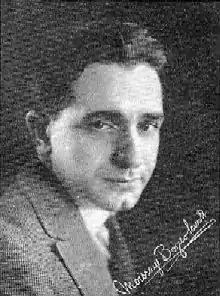Moissaye Boguslawski
Moissaye Boguslawski (November 1, 1887 – August 30, 1944) was an American pianist, composer, editor and teacher. Sometimes known as Bogie.
Moissaye Boguslawski | |
|---|---|
 | |
| Background information | |
| Born | November 1, 1887 Chicago, Illinois, U.S. |
| Died | August 30, 1944 (aged 56) |
| Genres | classical |
| Occupation(s) | pianist, composer, editor, teacher |
| Instrument(s) | piano |
| Years active | 1908–1944 |
Biography
He was born in Chicago in 1887 to Russian immigrants with significant musical background. Despite the family's poverty, Boguslawski began piano lessons at age 4 and began playing in public at weddings at the age of 10. By age 15 he was performing at a dance hall in Chicago. He also studied briefly with Rudolph Ganz.[1]
Boguslawski was named head of the piano department at the Kansas City Conservatory of Music when he was twenty years old. Recitals given during this time established him as a well-known pianist, and in 1916 a trip to the East Coast earned him good reviews in New York and Boston. Soon he was a sought-after performer both in concert and as a recorded radio performer. He performed with various orchestras and performers, including Emma Calvé and Antonio Scotti.[1] For Chicago's WJJD radio station (now WYLL), Boguslawski played all of Bach's piano music and all of the sonatas of Beethoven, taking a total of 21 weeks to accomplish.[2] He was a professor of piano at Chicago Musical College and at the Bush Conservatory of Music; later he was head of the Boguslawski College of Music.,[1] where students included Cecilia Clare Bocard.
Later in his career, Boguslawski composed pieces of his own, including a comprehensive set of children's teaching pieces with publisher M. M. Cole. Compositions include Hungarian Rhapsodie No. 1, Valse Russe, Frog's Frolic, and Overture to a Carnival.[1]
Boguslawski was known for skillfully attracting media attention. A 1936 piece in TIME magazine said of him, "When straight news about himself is scarce, 'Bogie' is likely to come forth with such a project as his proposal to promote world peace through voice culture, since animosity arises when unpleasant tones are heard."[2] Whatever his motivation, Boguslawski did influence the fields of music psychology and music therapy, contributing his theories about curing antisocial behavior and memory loss.[3]
References
- Oron, Aryeh. "Moissaye Boguslawski (Composer, Arranger)". Biographies of Poets & Composers. Bach Cantatas. Retrieved January 22, 2010.
- "Music: Bogie". TIME. October 12, 1936. Archived from the original on December 15, 2008. Retrieved January 22, 2010.
- Antrim, Doron K. (October 1944). "Music therapy". The Musical Quarterly. Oxford: Oxford University Press. 30 (4): 409–420. doi:10.1093/mq/xxx.4.409. JSTOR 739403.